Kamala Harris mourns Dodgers great Fernando Valenzuela and praises Mexican hero’s ‘indelible mark’ on US
Vice President Kamala Harris leads tributes to Fernando Valenzuela after the legendary Los Angeles Dodgers pitcher died Tuesday at the age of 63.
“Fernando Valenzuela was a baseball legend who united a generation of Dodgers fans in collective joy, excitement and awe,” she said of the Mexican-born Valenzuela, who gave birth to “Fernandomania” in the early 1980s.
“He inspired countless young baseball players – in America, Mexico and around the world – to pursue their own greatness. As a player, broadcaster and Angelino, Fernando Valenzuela left an indelible mark on our nation,” said the Democratic presidential candidate.
Finally, Harris “sent prayers to his wife, Linda, as well as their children and grandchildren” from herself and her husband, Doug Emhoff.
The mourning for Valenzuela comes at a time when his beloved Dodgers return to the World Series. In response to his passing, many observers of Fernandomania mourned in various ways at Dodger Stadium.
Legendary Dodgers left-hander Fernando Valenzuela died Tuesday at the age of 63
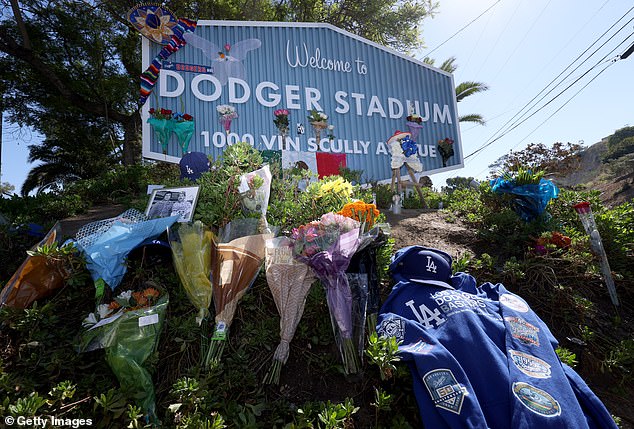
Tributes left for late Dodgers pitcher Fernando Valenzuela outside Dodger Stadium
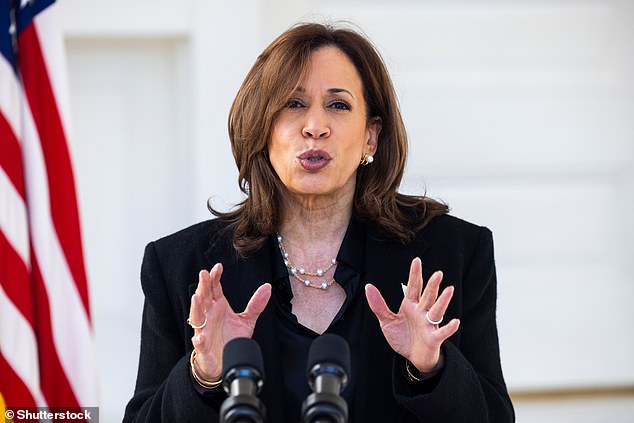
Vice President Kamala Harris leads tributes to Fernando Valenzuela
Julia Mendez carefully placed three candles in a row under a sign welcoming fans to Dodger Stadium. Then she pulled out a foil-wrapped burrito and rested it against the pole.
“I know he’s been eating a burrito all his life,” said the 70-year-old fan from North Hollywood who had been filling the flour tortilla with nopales and scrambled eggs in her kitchen.
The city of Los Angeles mourned Wednesday the Mexican-born Valenzuela, the Dodgers pitcher who inspired “Fernandomania” with his unique feats and dominant pitching exploits in the early 1980s.
“I came here to the United States in 1976. He came in 1979. That’s when all my pride and joy started,” said Mendez, from the same Mexican state of Sonora as Valenzuela. “He raised our name so high around the world that the entire community became a fan. My love for so many years.’
Valenzuela’s rise from humble beginnings as the youngest of twelve children in Mexico and his exploits on the mound made him enormously popular and influential in Los Angeles’ Latino community, while at the same time attracting new fans to Major League Baseball. Their fondness for him continued after his retirement.
Across the intersection, the Mariachi Garibaldi de Jaime Cuéllar ensemble played their guitars and trumpets.
The group regularly performs at Dodger games and was gathered for a planned television interview ahead of the World Series against the New York Yankees. They stuck around to pay their musical respects to the man nicknamed “El Toro.”
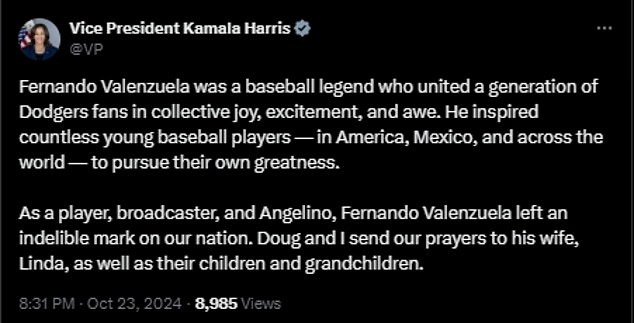
Harris noted Valenzuela’s impact in the US, Mexico and ‘around the world’
Major League Baseball and the Dodgers were working on a plan to honor Valenzuela before Game 1 of the World Series Friday.
In the left corner of the blue and white board hung a large sombrero and a colorful serape. Mendez had added white butterfly wings above the second ‘D’ in Dodger. The sign was a similarly emotional gathering place in 2022 when Dodgers Hall of Fame broadcaster Vin Scully died at age 94.
Henry Gomez of Gardena brought his 6-year-old daughter Tianna to the growing memorial outside the closed stadium. She carried a souvenir street sign that she and her father had written on and planned to leave.
“He’s one of the Spanish-speaking idols for us,” the elder Gomez said. “He opened a lot of doors for a lot of people behind him. We are proud of that.’
In the Boyle Heights neighborhood, not far from the stadium, Robert Vargas was painting a mural of Valenzuela on the side of a building. The artist of Mexican descent is known for his large-scale works in outdoor locations around the world. His mural of Dodgers superstar Shohei Ohtani on the side of a hotel in Little Tokyo has become a tourist attraction.
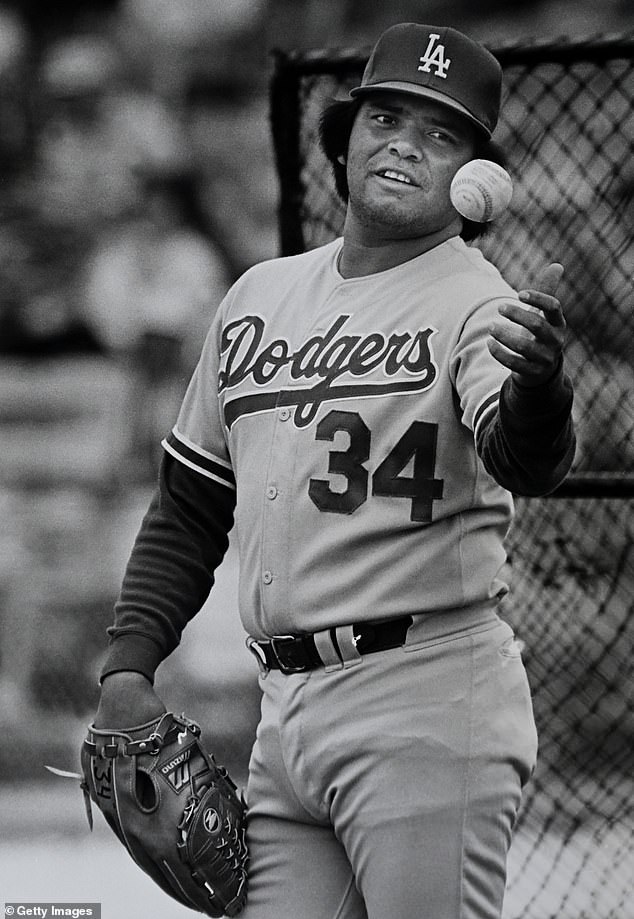
Valenzuela was known for his screwball, a pitch rarely seen in the Majors these days
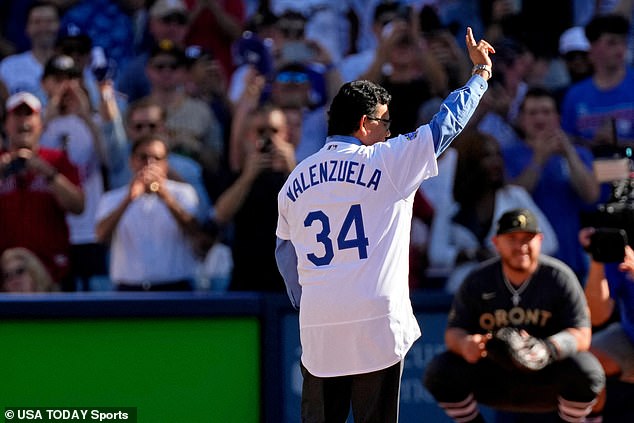
Valenzuela waves to the crowd before throwing out a ceremonial first pitch at Dodger Stadium
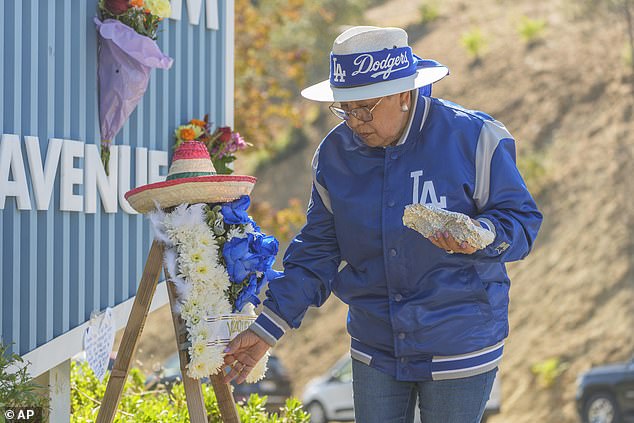
Julia Mendez, originally from Sonora, Mexico, holds up a burrito she cooked for Fernando Valenzuela as she walks past memorabilia, flowers and candles placed in his honor
Back at the stadium, three men stood in the shade, trading stories about Valenzuela’s exploits on the mound.
Gomez had the chance to shake Valenzuela’s hand a few times over the years.
“He was really cool, a good guy,” he said. “When you’re famous, that’s the way you should be, just like Fernando.”
Fans had gathered outside the stadium since the sad news broke on Tuesday evening.
Marcello Ambriz showed a photo of him as a 2-year-old with the pitcher.
“Mexicans wouldn’t be Dodger fans without Fernando,” he said.
The land on which Dodger Stadium sits was purchased by the city of Los Angeles from Hispanic homeowners in the early 1950s. They initially refused to sell, and the city used eminent domain to acquire the property from the close-knit Mexican American families, many of whom lived there after facing discrimination in other parts of the city.
“There’s a lot of sad feelings about that,” Ambriz said. ‘Fernando was able to fix that somehow. “Obviously there are a lot of people today who are hurt and can’t let go of that, and that’s understandable, but Fernando’s presence and his origins from Mexico have been able to unite that.”
Valenzuela would have turned 64 on Nov. 1, when the Dodgers could potentially host Game 6 of the World Series. This Friday is also Dia de los Muertos, or Day of the Dead, in Mexican culture, when deceased loved ones are honored.
“There is no reason to be sad because he lives forever in our hearts,” Mendez said. “He achieved the American dream, more than the American dream actually.”
